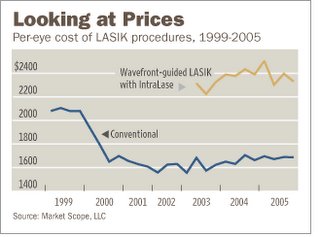
This chart accompanies a
great op-ed in today's
Wall Street Journal:
...The nearby chart tells the story. In early 1999, shortly after LASIK was first approved by the FDA, the average price for the procedure was about $2,100 per eye. By the end of last year, it had fallen about 20% to $1,687. Innovators have also responded to the demand for the service by developing a newer and more precise LASIK technology called "wavefront-guided" LASIK. Naturally, they charge more for this better, more accurate technology, but not much more than the standard procedure originally cost.
In short, the existence of a real market for the LASIK procedure has produced rapid improvements in technology and stable-to-falling costs. Between 1999 and 2004, by contrast, overall annual health expenditures per person in the U.S. increased to nearly $6,300 from $4,400, and the increase is being felt acutely by employers and their workers.
The LASIK experience also refutes the criticism of HSAs that individuals without comprehensive insurance coverage are likely to underconsume health care to their own detriment. If so many people are willing to ante up for optional procedures like LASIK, surely they'll be able to get used to more direct spending on urgent medical needs as well. Just as surely, everyone stands to benefit from a health-care marketplace in which LASIK surgeons and dentists aren't the only medical providers competing aggressively for business.
Proponents of government-run health care keep insisting that medicine is different from everything else in the economy in being immune to market forces. But the LASIK example shows that where a market in health care is actually allowed to function, with transparent pricing and incentives to spend wisely, the market works very well. The goal of public policy should be to make sure there's such a market across the entire health-care industry.
Indeed, many of the problems that mark the health care sector such as rising costs and limited choice are strangely absent when it comes to elective procedures such as plastic surgery that don't use health insurance. Vetenarian care also doesn't suffer from these problems. Coincidence?
 This chart accompanies a great op-ed in today's Wall Street Journal:
This chart accompanies a great op-ed in today's Wall Street Journal:
No comments:
Post a Comment